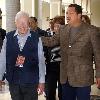

Tags: Jimmy Carter View |
color balance Topics: Politics Tags: Jimmy Carter View |
Tags: Jimmy Carter View |
|||||||||
Tags: Jimmy Carter View |
James Earl "Jimmy" Carter, Jr. (born October 1, 1924) served as the 39th (List of Presidents of the United States) President of the United States from 1977 to 1981 and was the recipient of the 2002 Nobel Peace Prize, the only U.S. President to have received the Prize after leaving office. Before he became President, Carter served two terms as a Georgia State Senator (Georgia Senate) and one as Governor of Georgia (List of Governors of Georgia), from 1971 to 1975, and was a peanut farmer and naval officer. As president, Carter created two new cabinet-level departments: the Department of Energy (United States Department of Energy) and the Department of Education (United States Department of Education). He established a national energy policy (Energy policy of the United States) that included conservation, price control, and new technology. In foreign affairs, Carter pursued the Camp David Accords, the Panama Canal Treaties and the second round of Strategic Arms Limitation Talks (SALT II). Throughout his career, Carter strongly emphasized human rights. He returned the Panama Canal Zone to Panama and faced criticism at home for what was widely seen as yet another signal of US weakness. He took office during a period of international stagflation which persisted throughout his term and eroded his popularity. The final year of his presidential tenure was marked by several major crises, including the 1979 takeover of the American embassy in Iran and holding of hostages (Iran hostage crisis) by Iranian students, an unsuccessful rescue attempt (Operation Eagle Claw) of the hostages, serious fuel shortages (1979 energy crisis), and the Soviet invasion of Afghanistan (Soviet war in Afghanistan). By 1980, Carter had become so unpopular that Ted Kennedy challenged him for the Democratic Party (Democratic Party (United States)) nomination in the 1980 election (United States presidential election, 1980). Carter survived the primary challenge, but lost the election to Republican (Republican Party (United States)) Ronald Reagan in a 44 state landslide. After leaving office, Carter and his wife Rosalynn (Rosalynn Carter) founded the Carter Center in 1982, a nongovernmental, not-for-profit organization that works to advance human rights. He has traveled extensively to conduct peace negotiations, observe elections, and advance disease prevention and eradication (Eradication of infectious diseases) in developing nations. Carter is a key figure in the Habitat for Humanity project, and also remains particularly vocal on the Israeli-Palestinian conflict.
Lieutenant2: Lester Maddox
Constituency3: Sumter County (Sumter County, Georgia)
Preceded3: New district
Succeeded3: Hugh Carter
Date of birth: 1924-10-01
Birth Location: Plains, Georgia
Birth Name: James Earl Carter, Jr.
Spouse: Rosalynn Smith Carter (Rosalynn Carter)
Children: John William Carter,James Earl Carter III,Donnel Jeffrey Carter,Amy Lynn Carter (Amy Carter)
Alma Mater: Georgia Southwestern College , Union College , United States Naval Academy
Profession: Farmer (peanuts), naval officer
Residence: Atlanta (Atlanta, Georgia), Georgia
Party: Democratic (Democratic Party (United States))
Religion: Baptist (Cooperative Baptist Fellowship)
Notable Prizes: File:Nobel prize medal.svgNobel Peace Prize in 2002
Branch: United States Navy
Rank: Lieutenant
39th (List of Presidents of the United States) President of the United States
In office: January 20, 1977-January 20, 1981
Predceded by: Gerald Ford
Succeeded by: Ronald Reagan
Vice President: Walter Mondale
Governor of Georgia
76th
In office: January 12, 1971-January 14, 1975
Predceded by: Lester Maddox
Succeeded by: George Busbee
Member of the Georgia State Senate from the 14th District
In office: January 14, 1963-1966




